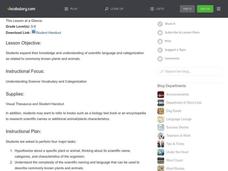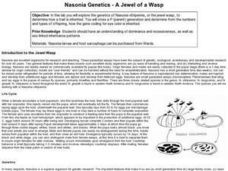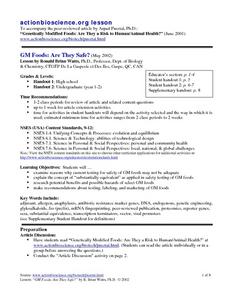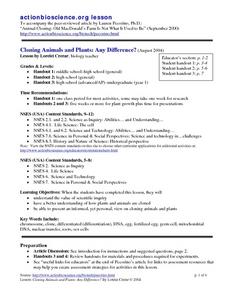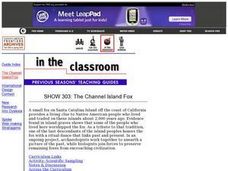Curated OER
Understanding Science Vocabulary and Categorization
Learners analyze scientific vocabulary words. In this life science vocabulary lesson, students complete a worksheet using VisualThesaurus as they evaluate words related to plants and animals and how the words are used.
Curated OER
Explore Your Natural Habitat
Students identify habitats and understand why they are important to our environment. In this environmental lesson students design their own habitat, observe and record data on the impact their habitat has on the environment.
Curated OER
Hatching chickens
Students recognize the need for gentle care of eggs. In this chicken hatching lesson, students observe the process of incubating eggs for hatching. Students find the materials needed to properly care for the chicks. Students complete a...
Curated OER
Ghost in Your Genes
Learners explore DNA microarrays. In this genetics lesson plan, students model DNA microarrays that are used by scientists. Learners work to determine levels of breast cancer genes in patients. They will determine the treatment required...
Curated OER
Naming New Species
Students explore science of taxonomy and the Five Kingdoms of life,
categorize organisms into Kingdoms, and create multi-media presentations illustrating knowledge of a Kingdom. They collect data and related pictures on the Internet,...
Curated OER
Nasonia Genetics-A Jewel of a Wasp
Learners investigate the inheritance pattern of eye color in Nasonia wasps. In this genetics and inheritance lesson plan, students read about the life cycle of Nasonia wasps and hypothesize about the possibilities of eye color inherited...
Curated OER
the Wonder of Wetlands
Students explore the importance of the wetland ecosystem, its properties and functions, as well as, the many birds, animals, and plant life found there.
Curated OER
Building a Clay Neuron
Learners investigate and then build neurons in this lesson. They are examined as key parts of the brain and nervous system and seen as different from normal cells.
Curated OER
California Biodiversity
Learners examine several maps of California exhibiting features such as precipitation, topography, and vegetation. They look for patterns that might be the source of or influence biodiversity in different regions. They pay particular...
Curated OER
A Natural Habitat: What, How and Why
Pupils understand what a habitat is. They determine why a habitat is important to our environment no matter where it is located. Students observe and recognize natural habitats in their surroundings.
Curated OER
GM Foods: Are They Safe?
Learners examine the process for testing GM foods. They research benefits and hazards of a selection of GM foods. They also create images of new labels and marketing for GM foods.
Curated OER
Cloning Animals and Plants: Any Difference?
Students examine the process in which plants and animals are cloned. They compare and contrast the two procedures and determine if there is a difference. They share their views on cloning to the class.
Curated OER
Discovering New Species
Students identify animals observed by Lewis and Clark while evaluating the animal's habitat and describing the animal's behavior. Students construct a food web mobile to illustrate the animal's position in the food web in the 19th...
Curated OER
Cypress/Tupelo Swamps
Learners study the geologic history of terrain, soils, and drainage patterns. They recognize ecological processes that determine the dynamic nature of habitats. They investigate the influence of human activity on the landscape.
Curated OER
Big Fleas Have Little Fleas!
Learners study seamounts and learn the importance of structures to species. In this ocean explorer lesson, students participate in an activity that teaches them how to modify a seamount so that they are more suitable for species.
Curated OER
Insect Biology and Ecology: A Primer
Students explore insects and closely related organisms. They examine the growth and development of a lady beetle. Students classify insects and organize them. They investigate pest management.
Curated OER
Communication in Bees
Eighth graders identify and interpret a scientific investigation and a hypothesis through experimentation and testing a hypothesis. They identify what scientists hypothesized about the communication of stingless bees. Finally, 8th...
Curated OER
SHOW 303: The Channel Island Fox
Students explore how archaeologists and other scientists use different clues to piece together a picture of the past. Students perform activities that allow them to conduct three types of scientific research. They discuss their...


